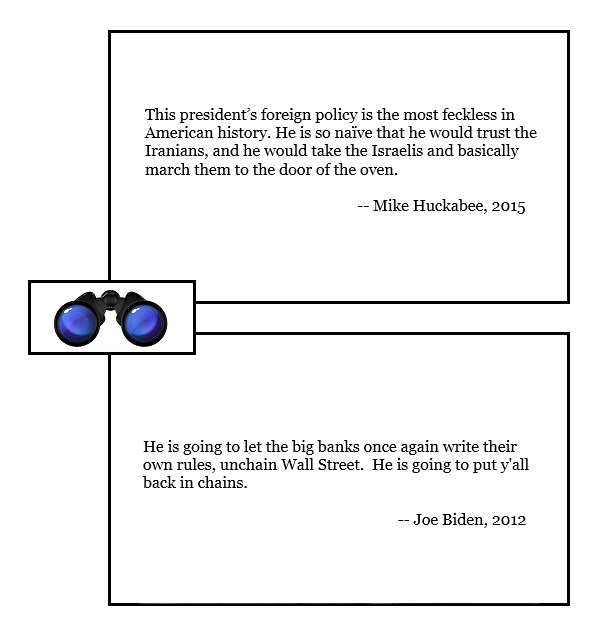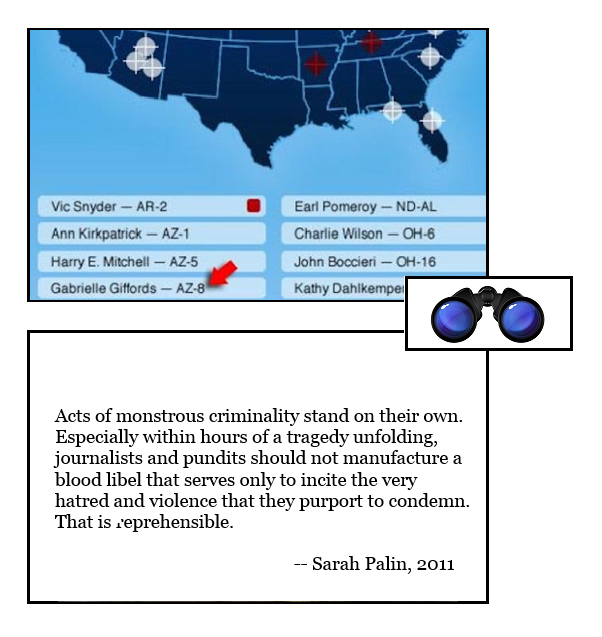[ by Charles Cameron — not exactly an enthusiast of negative campaigning ]
.
I’ve been having a series of conversations with my friend Tom Merino recently, and a couple of days ago he suggested two quotes to me for comparison:

I’ve formatted them in my usual DoubleQuotes style, but my friend calls the pairing DoubleSpeak and sees them as the starting point for an investigation of the vexed question — who uses the most frequent and vicious slurs against “the other side” — liberals or conservatives?
**
How would we even begin to measure that? Who would decide whether, for instance, smearing a Republican presidential candidate with a remark that clearly evokes slavery is a lesser or greater lapse than smirching a Democratic president with a remark that clearly evokes the Holocaust?
And who would host a venue where both liberals and conservatives could and would report abuses and insults of this sort, so that some measures of frequency, severity and authority could be employed in something resembling a fair ranking?
Note: on the difficulties of such ranking, see Malcolm Gladwell‘s The Order of Things.
**
And then there’s Sarah Palin, who used the phrase “blood libel” to describe attacks on her the wake of the shooting of Gabrielle Giffords — because she, Palin, had used a map with crosshairs on Democrats she hoped would be defeated.. Giffords included.

— the problem here being that “blood libel” refers pretty specifically to the accusation against the Jews that they bake matzoh for Passover using the blood of young Christian children they have slaughtered.
Again, the rhetoric she used trivialized the blood libel, just as Biden trivialized slavery and Huckabee trivializes the Shoah.
**
But then, hey — if putting cross-hairs on Democrats you’d like to see removed from office is itself an example of heated and dangerous rhetoric, wouldn’t the same be true of putting targets on Republicans you’d like to see removed?
Here’s a helpful DoubleQuote in the Wild:

Neither “targetting” political adversaries nor “having them in your crosshairs” equates to killing or there would have been a whole lot more attempted assassinations — just the one was bad enough.
Have some proportion, people.
**
How about that claim that Ahmadinejad said he wanted to “wipe Israel off the face of the map”?
Over the top rhetoric can be rabble rousing, it can also be a warning or a threat, and threats on occasion get carried into practice. So, serious as divisive language and a divided nation is (Luke 11.17), some rhetoric is charged with meaning that transcends mere words and implies — or impels or incites to — action.
Some details. Ahmadinejad didn’t say anything about “wiping Israel off the face of the map” — specifically, he didn’t use the word “map”, and he was quoting the Ayatollah Khomeini in any case. What he said is better translated “the regime occupying Jerusalem must vanish from the page of time.” That’s Juan Cole’s translation, admittedly — but Dan Meridor, Israel’s minister of intelligence and atomic energy, told an Al Jazeera interviewer “They didn’t say, ‘We’ll wipe it out,’ you’re right, but, ‘It will not survive.’”
Is that the end of it? Ahmadinejad didn’t say “wipe off the face of the map” but “vanish from the page of time”?
By no meanms. The faulty English translation was picked up by the Iranians and used, in English, on billboards:

That banner was on the outside of a Basij HQ.
There’s room enough for some nuance here, but also plenty of room for concern. I’ll include a selection of readings under “Sources & Readings” below..
**
Oh. Getting back to simple slurs..
Now I learn there’s a new word of scorn, applied by “alt.conservatives” to “conservatives.” Frankly, I find it a distasteful reminder of how low our public speech has fallen — but then I’m a Brit, and rank politeness pretty high — we’re more prone to understatement than plain speaking.
The Washington Post calls it “the the conservative insult of the month” and I won’t go there.
**
Sources & Readings:
Deena Zaru, Anti-Defamation League: Huckabee ‘completely out of line’
Mackenzie Weinger, GOP slams Joe Biden ‘chains’ remark
SarahPAC, Palin target map
Michael Shear, Palin Calls Criticism ‘Blood Libel’
RedState, Missouri GOP Senate Candidate Brunner Slams Sarah Palin For Rhetoric And “Cross-hairs” Map
Jonathan Steele, Lost in translation
Glenn Kessler, Did Ahmadinejad really say Israel should be ‘wiped off the map’?
Robert Mackey, Israeli Minister Agrees Ahmadinejad Never Said Israel ‘Must Be Wiped Off the Map’
Joshua Teitelbaunm, What Iranian Leaders Really Say about Doing Away with Israel: A Refutation of the Campaign to Excuse Ahmadinejad’s Incitement to Genocide








